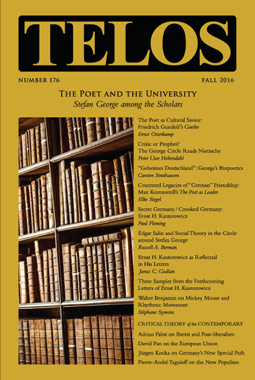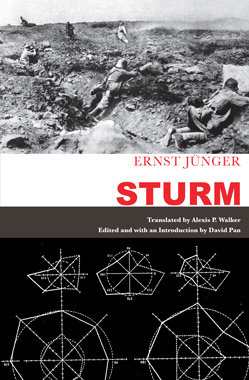 One often speaks of the importance of poetry for thought, even of poetry as a mode of thinking, and perhaps nowhere more than in Germany, the country of Dichter and Denker, of poets and thinkers. The German intellectual tradition is defined by a long, intimately interwoven relation between poetry and thought going back to the solidification of the Modern Age in the eighteenth century: Klopstock’s “Republic of Letters”; Goethe and Schiller’s Classicism, especially Schiller’s “aesthetic state”; Hölderlin’s “founding poets” and the centrality of poets in “the time of need”; Jena Romanticism’s inextricable relation between “Symphilosophie” and “Sympoesie”; Hegel’s definition of beauty as “the sensible shining forth of the idea”; and onward to this day.
One often speaks of the importance of poetry for thought, even of poetry as a mode of thinking, and perhaps nowhere more than in Germany, the country of Dichter and Denker, of poets and thinkers. The German intellectual tradition is defined by a long, intimately interwoven relation between poetry and thought going back to the solidification of the Modern Age in the eighteenth century: Klopstock’s “Republic of Letters”; Goethe and Schiller’s Classicism, especially Schiller’s “aesthetic state”; Hölderlin’s “founding poets” and the centrality of poets in “the time of need”; Jena Romanticism’s inextricable relation between “Symphilosophie” and “Sympoesie”; Hegel’s definition of beauty as “the sensible shining forth of the idea”; and onward to this day.
|
“Two reefs tower in front of the anarchist. The first, the state, must be overcome, especially in a hurricane, when the waves soar. He ineluctably runs aground on the second one, society, the very image that flickered before him. There is a brief intermezzo between the fall of the legitimate powers and the new legality. Two weeks after Kropotkin’s funeral cortege, in which his corpse had followed the Black Banners, the sailors of Kronstadt were liquidated. This is not to say that nothing had happened in between—Merlino, one of the disillusioned, hit the nail on the head: ‘Anarchism is an experiment.’” “The hooting of the owl with its tender wing is more familiar to me than the crowing of the cock. I prefer the strings to the woodwinds. Intermission: that is the darkness. The light feels like a vague scratching; it is malaise rather than pain. I am glad to sink back into darkness.” “When a man fell, the others stood together over his corpse; their gazes met, dark and deep. But when death stood over the trenches like a storm cloud, then it was every man for himself: he stood alone in the darkness, howling and crashing surrounding him, blinded by sudden flashes, with nothing in his breast but endless desolation.” —Ernst Jünger, Sturm, describing the soldiers awaiting attack during the Battle of the Somme, whose centenary is this year. “Fraternity means that the father no longer sacrifices the sons; instead the brothers kill one another. Wars between nations have been replaced by civil war. The great settling of accounts, first under national ‘pretexts,’ led to a rapidly escalating world civil war.”
|
||||
|
Telos Press Publishing · PO Box 811 · Candor, NY 13743 · Phone: 212-228-6479 Privacy Policy · Data Protection Copyright © 2024 Telos Press Publishing · All Rights Reserved |
||||








